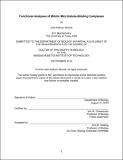Functional analyses of mitotic microtubule-binding complexes
Author(s)
Monda, Julie Kathryn
DownloadFull printable version (8.734Mb)
Other Contributors
Massachusetts Institute of Technology. Department of Biology.
Advisor
Iain M. Cheeseman.
Terms of use
Metadata
Show full item recordAbstract
Mitosis is the process by which a single cell divides to form two identical daughter cells. Each daughter cell must inherit a full complement of the genetic material. Thus, a critical aspect of mitosis is the faithful segregation of each duplicated chromosome. Chromosome segregation is achieved through the attachment of a chromosome-localized macromolecular complex, termed the kinetochore, to microtubules. Microtubules are dynamic polymers comprised of tubulin heterodimers. The successful execution of mitosis additionally depends on the organization of the microtubules into a bipolar array, termed the mitotic spindle. The depolymerization of kinetochore-bound microtubules generates the force required to properly segregate the chromosomes. The work in this thesis analyzes the molecular basis for the function and activity of two key players in microtubule function. First, I investigate the mechanisms by which the Ska1 complex facilitates the continued association of the kinetochore with microtubules, even as the microtubules grow and shrink. I show that Ska1 uses multiple surfaces to interact with diverse tubulin substrates, and each of these surfaces are required for microtubule tip tracking and optimal mitotic progression. Second, I analyze cytoplasmic dynein, a microtubule-based motor that is critically required to maintain spindle bipolarity and execute numerous other cellular processes throughout the cell cycle. The execution of these diverse functions of dynein relies on precise temporal and spatial regulation of dynein activity. Dynein regulation is accomplished in part by the association of adaptor proteins with the dynein complex, including Nde1. Here, I show that Nde1 utilizes distinct intermolecular interactions to regulate different dynein functions. I also identify a previously uncharacterized interaction between Nde1 and the 26S proteasome. Finally, I explore a potential role for post-translational modifications in regulating dynein function. I find that the localization of dynein during mitosis is rapidly altered following the addition of small molecule inhibitors of ubiquitination enzymes. Together, these findings provide new insights into the function and regulation of diverse components of the mitotic machinery.
Description
Thesis: Ph. D., Massachusetts Institute of Technology, Department of Biology, 2018. This electronic version was submitted by the student author. The certified thesis is available in the Institute Archives and Special Collections. Cataloged from student-submitted PDF version of thesis. Includes bibliographical references.
Date issued
2018Department
Massachusetts Institute of Technology. Department of BiologyPublisher
Massachusetts Institute of Technology
Keywords
Biology.